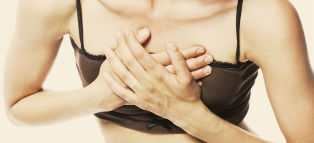If you have painful Breasts, and giving back, it is most likely that you have a problem with the internal organs located in the chest or the back. If you already have injuries, such as rib fractures, chest injuries, spinal injuries, and then, from time to time arise, the pain can be the result.
It also happens, that the pain bothered the person, and for a long period of time, and the painkillers only provide a temporary solution, and in this case, it is most likely that we're talking about a chronic or progressive condition that requires immediate medical treatment. We'll take a look at some of the disease, the symptoms of which is pain in the chest that radiates to the back.
If you have painful Breasts, and gives back the possible causes of the

The organs in the thoracic cavity is located sufficiently close to each other, and the pain that is occurring in one organ can spread to the other, to the different parts of the body like the waist, arms, neck, and belly. Sometimes, pain in the chest, there is provided, in the latter, it occurs in the following diseases:
1 of the reason why: the Problem with the skeleton
The problem with the skeleton, such as curvature of the spine, such as scoliosis, lordosis, and kyphosis. All of them are in the later stages, but it is not only the visual defects, such as asymmetry in the waist area, shoulder blades and shoulders, scoliosis, and joint pain. It is usually experience pain in the chest radiates to the back, sometimes with one hand, or the neck, while the man tries to take a more comfortable posture, typically a deforming of the spinal column. When the curvature of the spine, and for a long period of time is not correct, the person loses the ability to be in a comfortable position with a straight back, symmetrical in the shoulder, no sagging in the lumbar and thoracic part of the vertebral column, and in each and every year, it is the situation only going to get worse. Also, pain in the chest that radiates to your back, it may be due to inflammation of the costal cartilage, or, as they call it a disease Tietze's disease. At the time of the transition of cartilage (rib) to the sternum form a seal, a painful swelling of the. When there is pressure on it the pain increases, as well as when coughing and laughing. Most often, pain in the chest radiates to the back, especially when the change of the position of the body.
2, the cause of the Diseases of the digestive system
Diseases of the digestive system, may be accompanied by pain in the chest that radiates to the back. This is particularly the case for the development of cholecystitis in the absence of treatment, the sharp pain occurs in the chest, extending to the back, and is surrounded by the sign of the later, nausea, and the body temperature rises, which is accompanied by a fever. Spasm of the esophagus, it also causes pains in the chest radiate to the back. Painful sensations are oppressive in nature, and their occurrence is related to food intake. In certain cancers of the gastrointestinal tract, the chest pain radiate to the back, it is very important, as soon as possible to diagnose and begin treatment. Unfortunately, cancer of the gastrointestinal tract, the pain is frequently occurs when the tumor has already hit a large area.
3, the cause of the Diseases of the heart and blood vessels
Of angina (a condition caused by lack of blood supply to the heart muscle) is characterized by a sharp pain in the chest that radiates to the back. And the pain concentrated in the left part of the body, and is accompanied by shortness of breath, lack of air and the feeling of fear. Most often, angina pectoris occurs due to excess of physical activity in untrained people, often in older people. Also, if the Breasts are painful, it gives back, then it can be a sign of a serious illness, such as a massive pulmonary embolism. This disease has a blockage of the lumen of the pulmonary artery, as a result, the oxygen supply there. During the attack the person is not breathing, he feels a sharp pain in the chest, radiate to the back, and the breathing becomes frequent and superficial.
If the pain in your chest radiates to the back, and it bothers you very often, then it makes sense that it should be considered, especially if it is accompanied by such symptoms as shortness of breath, fainting, or signs of a problem in the digestive tract.



























